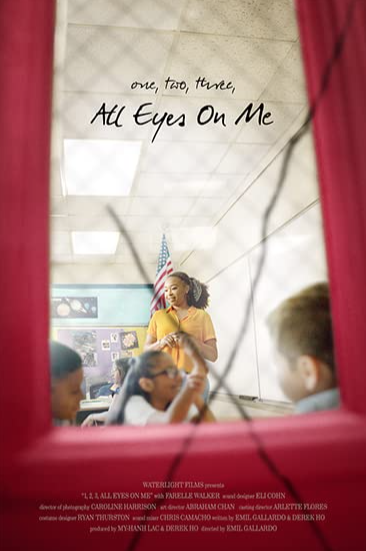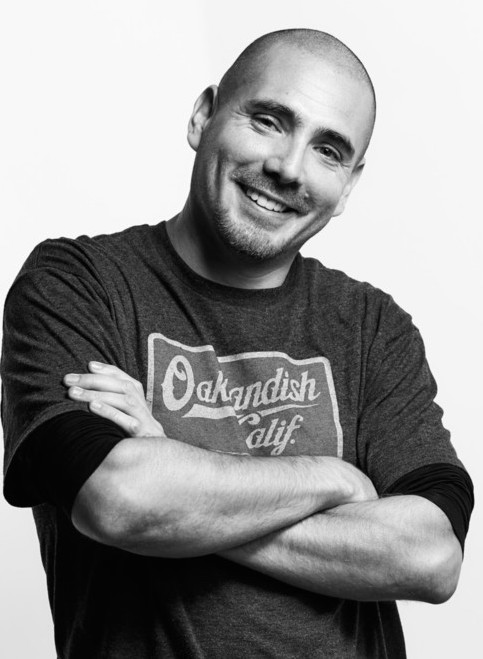Interview: Emil Gallardo on his Oscar Hopeful Short "1,2,3, All Eyes on Me"
 Friday, January 29, 2021 at 10:30AM
Friday, January 29, 2021 at 10:30AM
by Nathaniel R


In November this year a few of us here at The Film Experience had the pleasure of attending the HollyShorts festival virtually. Shorts festivals are a great way to catch exciting talent on the rise. My favourite of the shorts I screened was a drama on the very tough topic of school shootings called 1,2,3, All Eyes on Me by debut filmmaker Emil Gallardo. Gallardo won the top prize at HollyShorts and with it Oscar consideration, attention from managers, and a HBO Directing Fellowship. He's also working on a feature now with his writing partner Derek Ho.
But success wasn't as instant as it sounds. He worked for years as a Production Assistant and Assistant Director starting in the Aughts before opting for film school himself. He humorously compares himself to a fish and the set to a fish bowl; if he's not there he's just squriming around -- Plop him back in! But making a film is never an easy swim. "I literally had pneumonia," he says recalling post-production. "I dragged myself out of bed to meet the Sundance deadline only to get rejected. But I wasn't going to miss the deadline!"
[This interview has been edited for clarity and length]
NATHANIEL: I was actually worried when I queued up the film. It's the type of topic that can lead to all sorts of mistakes in filmmaking, being too glib, too exploitative. Did you have those concerns going in?
EMIL GALLARDO: Yeah, we did have some concerns. When we were writing the script we shared that with some friends. Some people did express that they were concerned that the film wouldn't be received well. 'This is a horrible thing that you're depicting and who's going to want to watch this?'
We obviously decided to make the film anyway. We set very clear boundaries for ourselves going into it. For example, we never wanted to show any actual violence.
Right.
EMIL GALLARDO: We didn't want to show any bodies. We didn't film anything like that. That was never our intention. Once we had clarity on the line that we were not willing to cross, from that point it was like 'let's make the best film we can within these parameters. And we'll just have to see how people react to it.' Fortunately the response to the film itself has been tremendously positive.
You made very smart decisions. I have to talk to you about your lead actress Farelle Walker because she really anchors this so beautifully as the school teacher. Her performance is so natural and spontaneous. How did you find her?
 Farrelle and Emil discussing a scene on set.
Farrelle and Emil discussing a scene on set.
EMIL GALLARDO: Yeah, Farelle is a gem. She's proof that there's so many talented actors and actresses that are out there that haven't been fully discovered yet. I found Farelle -- we were in a directing class together. She was participating as one of the actors. I did not get to work with her but I did get to see her do two scenes back-to-back one day. She did a scene from Before Sunrise as the French woman. And then we went to lunch and then she came back and played the cyborg from Ex Machina. And she nailed both roles! I was sitting there in awe of her ability and her commitment. And this was just in a class -- there were no cameras. We cast her pretty much immediately afterwards.
Hopefully clips from this short on her reel will bring some momentum for her career. I want to see her again! But back to you. This is quite a debut. It's so polished! Were you nervous to do this?
EMIL GALLARDO: I love being on set. I had a lot of on set experience, I just hadn't directed until film school. To me, nerves are always a sign that you're doing something special. Anytime I get those kinds of butterflies, it's just a signal to me that I'm really pushing myself out of my comfort zone. I like them.
Given the subject matter, was it hard to find a school that you could shoot in?
EMIL GALLARDO: Surprisingly no!. I think from having this A.D. background, whenever my partner and I are writing, I'm always thinking 'how are we actually going to pull this off?' My two big concerns going into this were how are we ever going to find twenty kids and parents to agree to this... and then how are we ever going to find a school?
But early on in the process, I found a few location managers in the Bay area where we filmed this and I reached out and one of them, David Weber who sayd, 'You'll never be able to afford me, but, I really respect what you're doing. And I'm happy to send you a list of schools I've shot at or are receptive.'
I started with that list, jumped on Google maps, tried to find locations that I thought could work and then reached out to them. And the principal at the school where we ended up filming was completely supportive. I was also completely transparent from day one. And similarly, she just really believed in what we were trying to do and said like, 'you're just going to have to pay for any damages you cause.' Fortunately we didn't cause any!

Was it similar with parents and child actors?
EMIL GALLARDO: That was a little rougher, but again, we kind of anticipated that and it was similar with the crew. Our approach was to be very forthright. So for example in the casting calls, I made the entire script available -- not just the sides. I put specifically in the instructions for the parents, please read the script in its entirety by yourself first. Then if you're comfortable, would you please read it with your child? Talk about it. Then if you're still comfortable, submit for the audition. And then in the auditions I had the parents in the room and I just really tried to make everybody aware of what we were making. The same thing was true for crew.
Some kids dropped out and some potential crew members dropped out and this is all, you know, way in advance. There were people who just said, 'you know, this... I don't think my child... [pauses]
You don't want to give people nightmares.
EMIL GALLARDO: Yeah. One crew member said, 'You know, I have a lot of family that work as teachers and I just don't think I could do my job, like I need to in this setting.' And I totally understand that. I respect that and no hard feelings at all.
Your short is so well made but I think the sound design was my favorite craft element. Was that something you had a lot of ideas about or did you just find a great sound person?
EMIL GALLARDO: I love sound. I would be a sound designer if --- well, I don't think I could do it as a job, but I have a huge passion for it. A film is what you see and what you hear and that's it. So it's like 50% sound. With this film while writing it, we knew that so much of it was going to be off screen. And so that meant that a lot of it was going to be what you hear. And we literally picked different weapons for both of the gunmen. So you could understand where they were based on where the sound was coming from. And we could give them more character just through the sound of the weapons they were using. I worked with Nocturnal Sound in New York. They are phenomenal. I cannot recommend them highly enough.
After the HollyShorts win -- which is a big deal, Oscar qualifying and all -- well, how much do you know about the Oscar process?
EMIL GALLARDO: I know very little about it and I think this year is kind of the fluke because of COVID. And I think a lot of the stuff that typically has happened, is different this year.
That's true. It must be exciting anyway, though.
EMIL GALLARDO: Honestly it's still kind of sinking in. At the stage of my career that I'm at to, you know, just even logging into the Academy website to submit the film -- people spend decades doing this and don't see those webpages or have that experience. So I feel extremely fortunate and I'm beyond proud of what our whole team accomplished. I get to do these interviews and I get to be the face, but I very much want to underscore that this is a team effort of at least fifty people through all the different phases. So I'm just extremely proud of all of us.

Because you've just had a breakthrough, what advice would you give people in film school or people who want to do this, whoever or wherever they are?
EMIL GALLARDO: Focus on the story. You'll hear that you can go and shoot a movie on your phone, and that's definitely true. But I do think a lot of times we rush the story because we're so excited. Your classmates or your crew members or your friends -- you might have this whole group of people that are ready to go and you have this cool idea. But even if you don't have a large budget, you can still make something really impactful if the story affects people.
And, so I would just say concentrate on the story, take the time that you need, get the notes that you need, rewrite it as many times as it takes, be collaborative. Actors are gonna have amazing ideas about their characters. Incorporate those. It's not that other elements aren't important but they come after the story.
That's spoken like a writer/director rather than just a director.
EMIL GALLARDO: Well, that's why I refuse to let them -- people ask me 'Are you a writer or are you a director?' I'm like, 'No, no, I'm both! They're both vital to me. So yeah, that is the writer but I'm directing what we've written. They're so intertangled for me.

The finalist list for Best Live Action Short will be announced on February 9th, 2021 with the five nominees following on March 15th, 2021.



Reader Comments (2)
An eloquent guy that clearly loves filmmaking and film itself. I’ll have to catch this movie.
I’m also very, very interested in an actress compared to the likes of Julie Delpy and Alicia Vikander. My actressexuality is piqued.
Can't wait to see this.